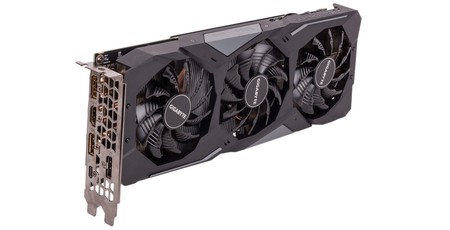
Performance Analysis
A more detailed analysis of RTX 2060 Super performance can be found in our original review, but suffice it to say that 1080p is easily handled by this card. Gigabyte’s version averages between 69fps and 117fps here, meaning it’ll be an awesome pairing with a high refresh rate panel. At 1440p, average frame rates are never below 53fps, and half of our games are well over 60fps – this is the sweet spot, especially as the 99th percentile is never less than 33fps, and even that result comes from our toughest game, Metro Exodus, which runs faster in-game than the built-in benchmark. VR is also a valid use case, but 4K is stretching things too far, at least in demanding games, hence why we haven’t tested it here.
With its higher overclock and power limit, Gigabyte delivers over two percent more performance than MSI on average (up to four percent) and close to five percent more than the Founders Edition (up to eight percent). These aren’t big differences, but they’re quite high given that the underlying GPU is the same. In both comparisons, improvements to the 99th percentile are typically higher than the average frame rates, suggesting more consistency in frame times as well, and DX12 titles seem to benefit more than DX11 ones. Meanwhile, the RTX 2070 Super remains about 11 percent faster, and Gigabyte has a solid 18 percent lead over the regular RTX 2060.
The RX 5700 XT is the obvious AMD comparison and is 0.9 percent faster overall. The game-to-game variation is pretty wild, however; Far Cry New Dawn at 1080p shows a nine percent difference in Nvidia’s favour, but AMD is 10 percent faster in Metro Exodus at 1440p. Indeed, Nvidia comes off better in DX11 and 1080p comparisons, while AMD tends to favour DX12 and 1440p tests, though there isn’t enough data to generalise this. Other cards of interest are Vega 64 and RX 5700; Gigabyte is about 16 and nine percent faster than these on average, but again inter-game variation can be quite dramatic.
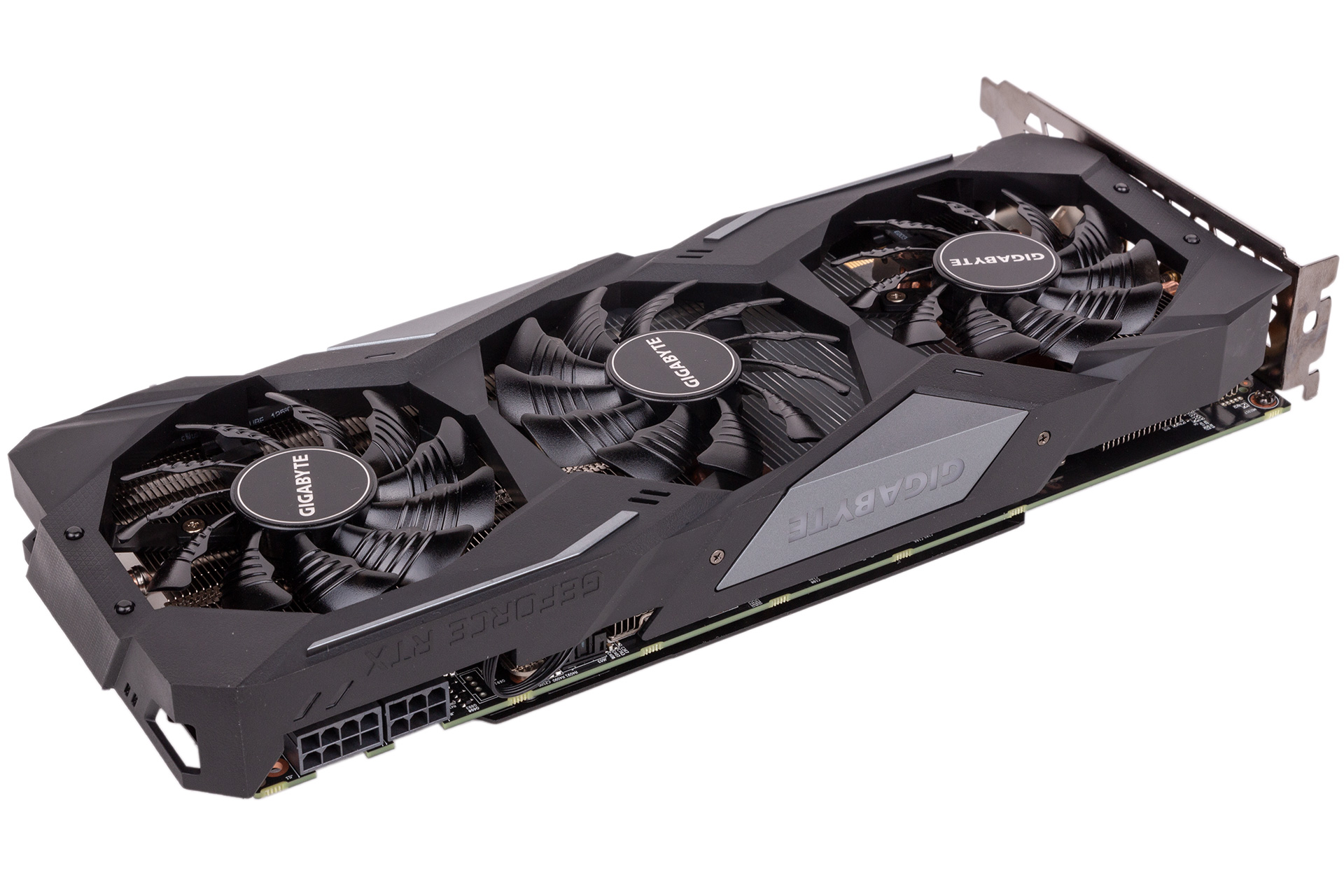
Ray tracing tests in Metro Exodus see performance fall by 17 percent at 1080p and 21 percent at 1440p. With a sub-30fps 99th percentile result at 1440p, we recommend sticking with 1080p if you intend on making good use of the RT Cores.
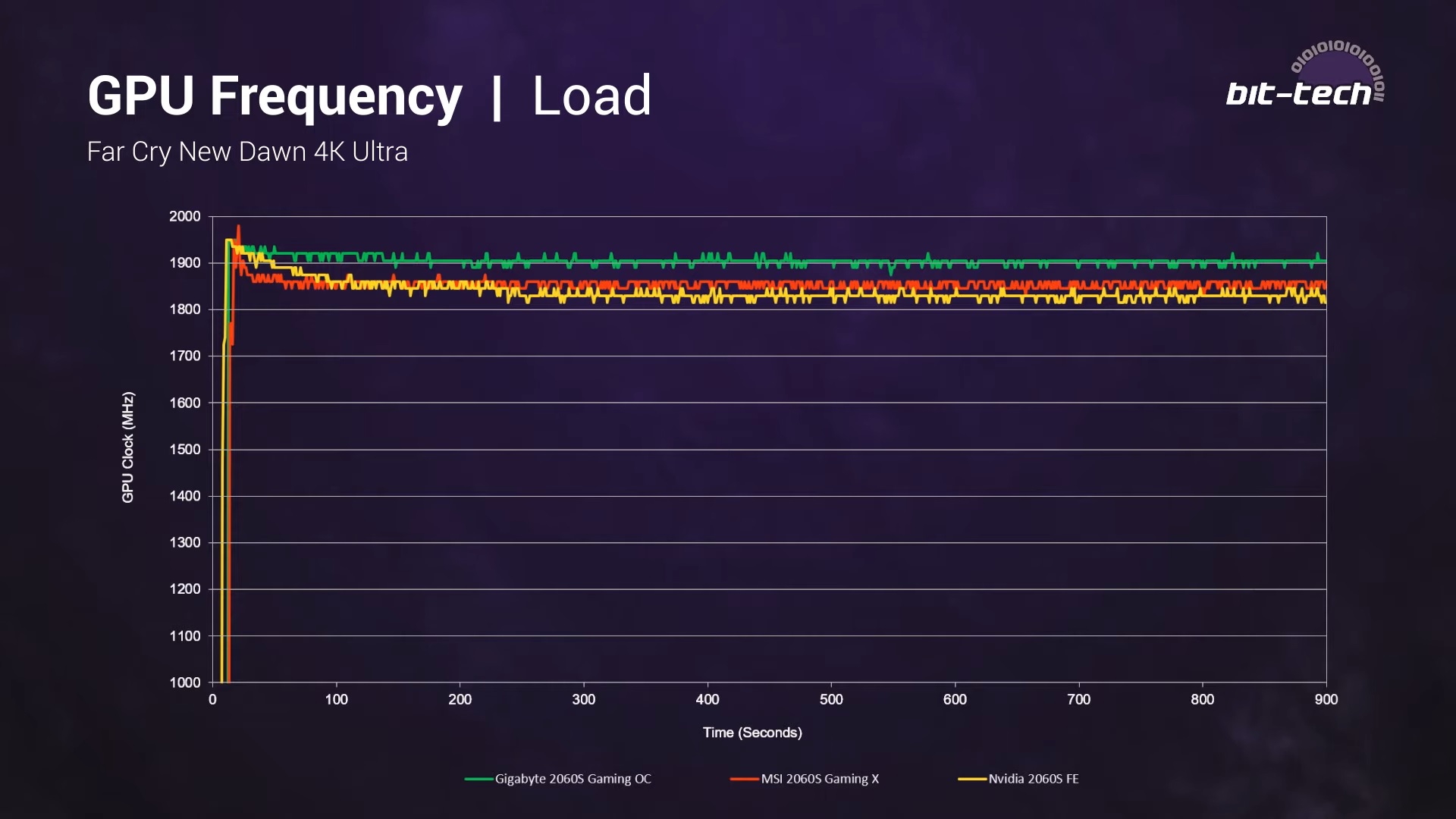
The boosting on this card is noticeably better than both the MSI Gaming X and the Founders Edition. As well as it just being higher in general (1,905MHz consistently out of the box), the frequency versus time plot shows a straighter, less bouncy line for Gigabyte (green), indicating fewer power limitations. There’s also no real sign of thermal throttling, with Gigabyte maintaining the same clocks after 15 minutes of load as it did after just two.
Power consumption is, as expected, higher than the other 175W-rated RTX 2060 Super cards, but that’s always a sacrifice you have to make when running Turing GPUs significantly faster than stock. Thankfully, it doesn’t exceed the figures for either RTX 2070 Super or RX 5700 XT.
Thermal performance is great too; a delta T of 44°C is technically better than we saw from MSI and Nvidia, but 2°C is not significant in this test – all three cards run nice and cool. Pleasingly, Gigabyte isn’t just ramping its fan really high to get this result; we found the noise output nicely balanced and not intrusive.
Overclocking allowed us to add seven percent more performance in synthetics and games. This still wasn’t enough to catch baseline RTX 2070 Super performance, but it was certainly close. The downside is that power efficiency goes out of the window, with system power consumption rising to over 400W (greater than even the RTX 2080 Super), but the cooler still maintained a nice balance of noise and thermals with only a slight increase in fan speed and a moderate 4°C rise in delta temperature.
Conclusion
Ever since the RTX series debuted, Nvidia has left its partners in a tough position by making its Founders Edition cards so good. With the new Super launches, all of these come in at reference pricing too, making it even harder for partners to distinguish themselves with additional features and performance, at least without costs skyrocketing.
Gigabyte is to be commended, then, for doing just that. Distinguishing itself from most rivals with a hefty overclock, it offers up to eight percent more performance than the Founders Edition (five percent on average), which is good news given its 13 percent higher pricing.
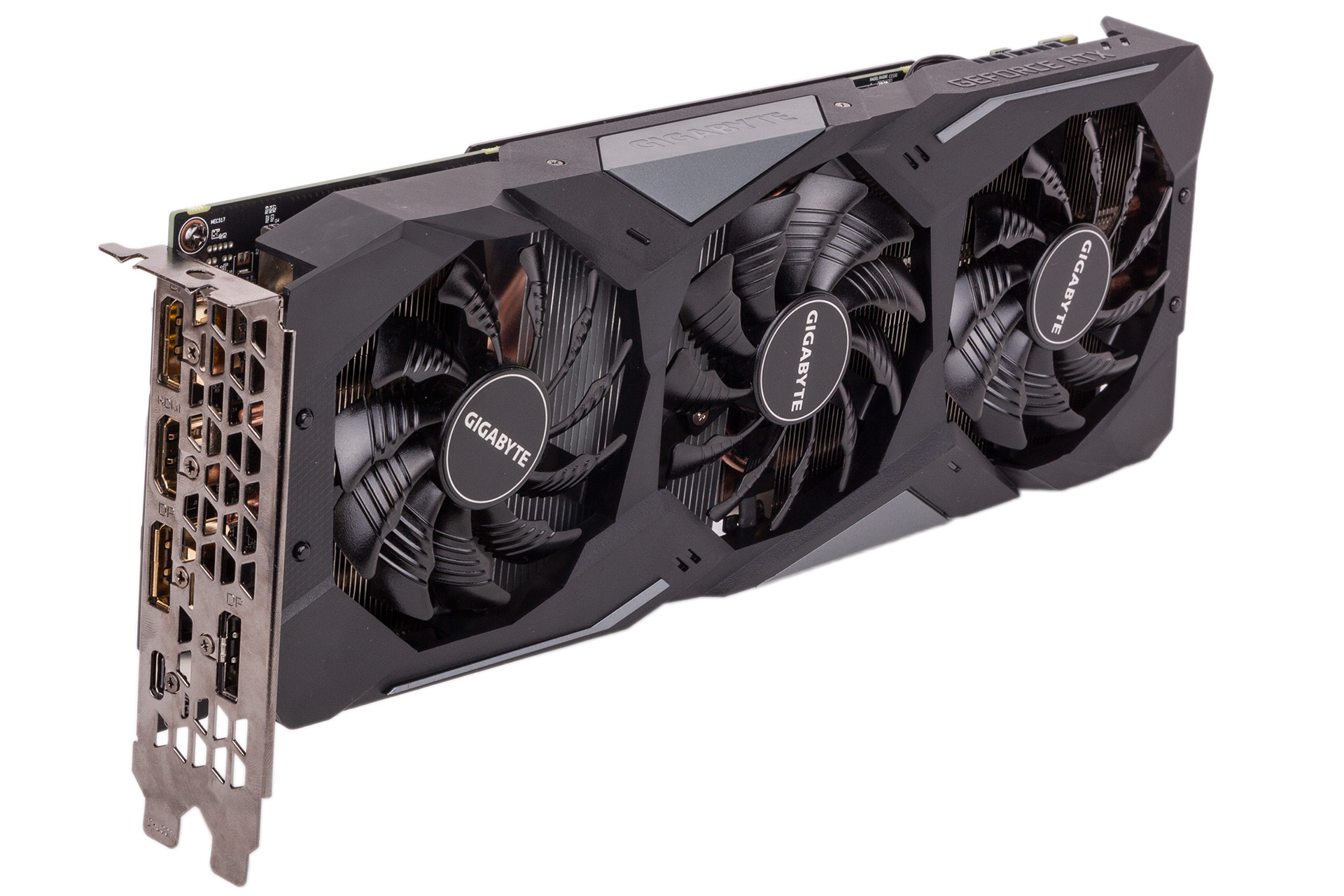
By upping the power delivery, Gigabyte also ensures boost clocks are consistently high, and it unlocks much more performance potential than either Nvidia or MSI, with our card overclocking to near-RTX 2070 Super levels, albeit at the cost of efficiency. It has a comprehensive cooling solution that takes proper care of all key components while not getting too loud, and it also includes a semi-passive fan mode and a token level of RGB lighting.
It’s actually hard to fault this card besides it not having a memory overclock, and the award below is recognition of that. With RTX 2060 Super FE currently out of stock, more buyers will turn their attention to AIB units, and while Gigabyte’s card is at the upper edge of what you should ever pay for this GPU, it does plenty to justify this. Making so much power available and having a cooling solution that cope with it is a really wise move and is the key thing separating Gigabyte from MSI at this price point. If you’re not going to overclock, the Founders Edition is better value, but if you’re willing to play around you’ll be much better off with this card, assuming the silicon lottery isn’t too harsh on you.
As ever, though, the best advice it to wait and see what custom Navi cards can do. The £380 reference RX 5700 XT is already on par with this overclocked £430 RTX 2060 Super, so AIB versions of RX 5700 XT with better cooling and (hopefully) decent overclocks stand a chance of being much better buys. We’re already getting whiffs of these card (Asus has just today announced its ones), so it’s worth holding off a little longer and seeing what comes to market.


MSI MPG Velox 100R Chassis Review
October 14 2021 | 15:04


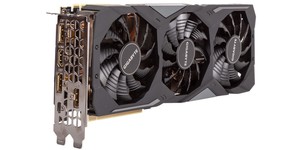





Want to comment? Please log in.